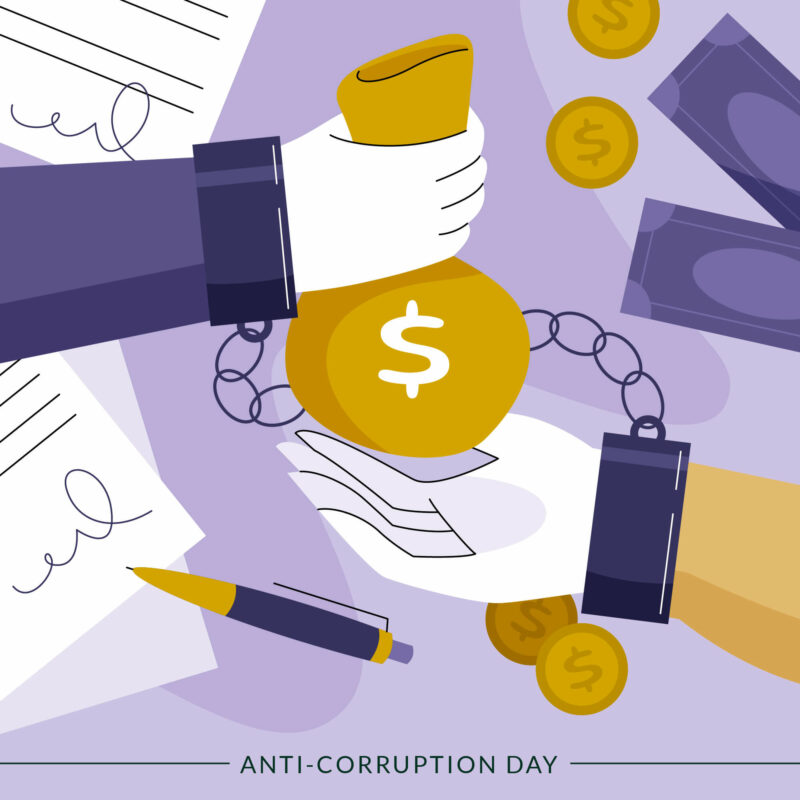Corruption involves dishonest or unethical behavior, while destruction entails the act of causing damage or ruin to something.
When it comes to corrupt practices and destructive behaviors, there are significant differences that distinguish these two concepts. Understanding these differences is crucial in addressing the challenges they pose to society. In this article, we will explore the definitions of corruption and destruction, their connection, and their impacts on individuals and communities.
Key Takeaways:
- Corruption refers to dishonest or fraudulent conduct by those in power, while destruction involves the decay and collapse of something.
- Corruption can manifest through various forms, such as bribery, fraud, and abuse of functions.
- Destruction has severe consequences, including the loss of life, displacement of populations, and destruction of infrastructure.
- Corruption and destruction are interconnected, with corruption often contributing to the decay and decomposition that leads to destruction.
- Addressing corruption and preventing destruction require comprehensive strategies, including education, collaboration, and individual responsibility.
Understanding Corruption

Corruption is a complex concept that involves dishonest or fraudulent conduct, often exhibited by those in positions of power. It encompasses a wide range of behaviors and practices that undermine transparency, fairness, and the rule of law. By understanding the definition of corruption and its various manifestations, we can gain insights into its impacts on society.
Corrupt practices can take many forms, including bribery, fraud, abuse of functions, and illicit enrichment. These practices involve individuals misusing their power or influence for personal gain, often at the expense of the greater good. The consequences of corruption can be far-reaching, affecting governance, economic development, and social progress.
Legal standards and international conventions provide specific definitions of corrupt conduct, helping to establish a framework for identifying and combating corruption. These definitions serve as important tools in legal proceedings and investigations, enabling the prosecution of those involved in corrupt practices.
Here is a table summarizing some common corrupt practices:
| Corrupt Practice | Description |
|---|---|
| Bribery | Offering, giving, receiving, or soliciting something of value to influence an action or decision |
| Fraud | Intentional deception or misrepresentation for personal gain |
| Abuse of Functions | Improper use of power or authority for personal gain or to harm others |
| Illicit Enrichment | Accumulation of wealth or assets through unlawful means |
As we delve deeper into the understanding of corruption, we can explore its far-reaching implications on society. From undermining trust in institutions to hindering economic development, corruption poses significant challenges that require collective efforts to address.
Exploring Destruction

Destruction is a process characterized by decay and decomposition, ultimately leading to the downfall or collapse of something. It manifests through a variety of destructive behaviors that have adverse effects on individuals, communities, and societies at large. The consequences of destruction can be far-reaching and have long-lasting impacts.
Destructive Behaviors
Destructive behaviors encompass a broad range of actions that result in harm, damage, or the deterioration of systems, structures, or relationships. These behaviors can take many forms, including violence, negligence, abuse, and vandalism. While some destructive behaviors are intentional acts driven by malice or hostility, others may stem from ignorance, negligence, or a lack of understanding of the potential consequences.
Destructive behaviors can have detrimental effects on various aspects of life, from the individual level to societal structures. They can compromise personal well-being, disrupt communities, and undermine the fabric of societies by eroding trust, stability, and social cohesion.
Downfall and Collapse
The ultimate result of destructive behaviors is often the downfall or collapse of the entity or system targeted. Whether it is the crumbling of physical infrastructure, the disintegration of personal relationships, or the breakdown of social institutions, the consequences of destruction can be catastrophic. The process of downfall and collapse can be gradual or sudden, depending on the nature and extent of the destructive behaviors.
The downfall or collapse caused by destruction can have significant consequences, including loss of lives, displacement of communities, and long-term social and economic disruptions. Rebuilding and recovering from such devastation can be a challenging and arduous process that requires substantial resources, time, and effort.
Visualizing the Impact of Destruction
Take a moment to visualize the impact of destruction and its long-lasting consequences. Let the image below paint a vivid picture of the havoc wreaked by destructive behaviors:
Table: Destruction and its Effects
| Effects | Examples |
|---|---|
| Loss of lives | Natural disasters, wars, terrorist attacks |
| Displacement | Forced migration due to conflict or environmental disasters |
| Infrastructure damage | Collapsed buildings, destroyed roads |
| Social upheaval | Breakdown of trust, increased crime rates |
| Economic ramifications | Loss of businesses, disrupted supply chains |
Through understanding the definition of destruction, the various destructive behaviors, and the consequences of downfall and collapse, we can appreciate the importance of preventing and addressing such destructive actions. By promoting empathy, compassion, and responsible behavior, individuals and communities can actively work towards creating a more harmonious and resilient world.
The Relationship Between Corruption and Destruction
Corruption and destruction are intrinsically linked, with corruption often being a cause of destruction. Corruption, characterized by dishonesty and unethical behavior, can contribute to the decay and decomposition that leads to destruction.
Throughout history, various societies have witnessed how corruption played a significant role in their downfall. An example of this is the decline of the Roman Empire, where corruption eroded the integrity of the government and weakened the social fabric of the empire.
Corruption can have both direct and indirect destructive effects. Directly, it undermines transparency, accountability, and the rule of law, leading to a breakdown of societal structures. Indirectly, corruption creates a culture of dishonesty and unethical behavior, perpetuating systems that prioritize personal gain over the common good.
The destructive effects of corruption extend beyond immediate consequences and can have long-term impacts. It hampers economic development by misallocating resources and creating barriers to fair competition. Additionally, corruption erodes public trust in institutions and fosters social inequality.
Efforts to combat corruption and reduce its destructive effects require comprehensive strategies. Strengthening legal frameworks, enhancing transparency and accountability, and promoting a culture of integrity are essential steps in minimizing corruption’s impact on society.
Destructive Effects of Corruption
| Destructive Effects | Description |
|---|---|
| Undermines Transparency | Corruption diminishes transparency in government and business operations, making it difficult to detect and prevent further corrupt practices. |
| Undermines Accountability | Corruption erodes accountability, allowing individuals to escape punishment for their corrupt actions, thereby perpetuating a culture of impunity. |
| Undermines Rule of Law | Corruption undermines the rule of law by distorting the justice system and impeding fair and impartial decision-making. |
| Leads to Economic Misallocation | Corruption diverts resources away from productive activities, resulting in an inefficient allocation of resources and hindering economic growth. |
| Fosters Social Inequality | Corruption perpetuates social inequality by creating a system where access to basic services and opportunities is determined by corrupt practices rather than merit. |
The destructive effects of corruption on society highlight the urgency of addressing this issue. By implementing robust anti-corruption measures and fostering a culture that rejects corrupt practices, we can work towards building a more transparent, accountable, and resilient society.
The Impact of Corruption on Society
Corruption has far-reaching effects on society, influencing various aspects of governance, public trust, and economic development. The detrimental consequences of corruption permeate through different spheres of society, hindering progress and perpetuating systems that prioritize personal gain over the common good.
The Effects of Corruption on Society
- Undermines Good Governance: Corruption erodes the principles of good governance by compromising transparency, accountability, and the rule of law. When corrupt practices go unchecked, it weakens the foundations of democratic institutions and erodes public trust in the government.
- Erodes Public Trust: The prevalence of corruption erodes public trust, leading to disillusionment and a sense of injustice among the population. When citizens witness corrupt acts going unpunished, it diminishes their faith in societal institutions and fosters a culture of cynicism.
- Hampers Economic Development: Corruption has a detrimental impact on economic development. It diverts resources away from productive sectors, leading to misallocation and inefficient use of resources. This deters foreign investments, hinders economic growth, and perpetuates poverty and inequality.
- Cultivates Unethical Behavior: Corruption creates a culture of unethical behavior in society. It normalizes dishonesty and fosters a mindset that prioritizes personal gain at the expense of communal well-being. This undermines social cohesion and perpetuates a cycle of corruption.
The Role of Corruption in Governance
Corruption poses significant challenges to governance systems, impeding the effective functioning of public institutions and undermining the principles of democracy. It weakens the rule of law and perpetuates systems of patronage and favoritism, where decisions are driven by personal gain rather than the public interest.
Corruption also hampers transparency and accountability, making it difficult for citizens to hold those in power accountable for their actions. This lack of accountability further erodes public trust and perpetuates a culture of impunity.
The Effect of Corruption on Economic Development
Corruption hinders economic development by distorting market mechanisms and deterring investments. It creates an uneven playing field, favoring those with illicit connections rather than those with innovative ideas and productive capacity.
Corruption leads to inefficiencies, as resources are redirected towards bribes and kickbacks rather than productive activities. This diverts funds away from essential services such as education, healthcare, and infrastructure development, hindering social progress and perpetuating poverty.
Moreover, corruption undermines fair competition and discourages entrepreneurship. It stifles innovation and discourages honest businesses from entering the market, leading to reduced economic growth and job creation.
Combatting Corruption for Effective Governance and Economic Growth
Addressing corruption is crucial for fostering good governance and promoting sustainable economic development. It requires a multi-faceted approach involving legal reforms, institutional strengthening, and a culture of transparency and accountability.
Key measures include:
- Strengthening legal frameworks: Implementing robust anti-corruption laws and regulations that hold individuals and organizations accountable for corrupt practices.
- Promoting transparency: Enhancing transparency and accountability in public procurement, financial management, and decision-making processes to mitigate corruption risks.
- Cultivating a culture of integrity: Fostering ethical values and integrity through education, awareness campaigns, and the promotion of a strong ethical code of conduct.
- Encouraging citizen engagement: Empowering citizens to participate actively in governance processes, enabling them to monitor government activities, report corruption, and hold public officials accountable.
- International cooperation: Promoting international cooperation and collaboration to combat corruption across borders, ensuring the effective prosecution of corrupt individuals and the recovery of stolen assets.
Efforts to combat corruption not only contribute to effective governance but also create an enabling environment for economic growth and social progress. By addressing corruption, societies can pave the way for a more equitable and prosperous future.
The Consequences of Destruction
Destruction can have severe consequences that impact individuals, communities, and societies as a whole. The repercussions of destruction can be far-reaching and long-lasting, affecting various aspects of life.
One of the most tragic consequences of destruction is the loss of life. When disasters strike, whether natural or man-made, people can lose their lives in the process. Lives are cut short, families are torn apart, and communities are left grieving.
In addition to the loss of life, destruction often leads to displacement of populations. Entire communities may be forced to flee their homes and seek refuge elsewhere. This displacement can result in a loss of livelihoods, social networks, and cultural ties. It disrupts the stability and fabric of communities, creating challenges for both the displaced individuals and the host communities.
The destruction of infrastructure is another significant consequence of destruction. Homes, schools, hospitals, and other essential facilities can be damaged or completely destroyed in the aftermath of a disaster. This loss of basic amenities further exacerbates the hardships faced by affected communities and hampers their ability to recover and rebuild.
The process of rebuilding after destruction is often arduous and requires significant resources. It involves not only physically reconstructing the damaged infrastructure but also addressing the emotional, social, and economic needs of the affected communities. Rebuilding efforts must focus on providing essential services, restoring livelihoods, and creating sustainable solutions that can mitigate future risks.
Furthermore, the impacts of destruction extend beyond the immediate aftermath. They can have a profound effect on the social fabric of communities, leading to increased poverty, inequality, and vulnerability. The long-lasting consequences of destruction are felt for years, if not decades, as communities struggle to recover and regain their former stability.
| Consequences of Destruction | Societal Impacts of Destruction |
|---|---|
| Loss of life | Displacement and loss of cultural ties |
| Destruction of infrastructure | Disruption of essential services |
| Challenges in rebuilding | Economic hardships and inequality |
| Long-lasting effects on community fabric |
The consequences of destruction require a collective and coordinated response. Efforts to mitigate and address the impacts must prioritize the well-being and needs of affected individuals and communities. By understanding and acknowledging the severe consequences of destruction, we can work towards building resilient societies that are better prepared to withstand and recover from disasters.
Addressing Corruption and Destruction
To effectively combat corruption and prevent destruction, it is crucial to implement concerted efforts and comprehensive strategies. Anti-corruption measures play a vital role in combating corrupt practices and promoting transparency and accountability. Simultaneously, building resilience in the face of destruction requires investing in disaster preparedness and supporting affected communities in their efforts to rebuild.
One of the most effective ways to combat corruption is by strengthening legal frameworks and ensuring strict enforcement of anti-corruption laws. This can include criminalizing corrupt practices such as bribery, embezzlement, and abuse of functions.
Promoting transparency and accountability is another vital aspect of anti-corruption measures. By implementing systems that ensure the transparency of financial transactions and decision-making processes, it becomes more difficult for individuals to engage in corrupt activities without detection.
Fostering a culture of integrity is essential in the fight against corruption. Educating individuals about the detrimental effects of corruption and promoting ethical behavior can help create a society that values honesty and rejects corrupt practices.
Preventing Destruction:
Preventing destruction requires investments in disaster preparedness. This includes developing early warning systems, implementing evacuation plans, and educating communities about disaster response strategies.
Effective response mechanisms are crucial in minimizing the destructive impact of disasters. This involves coordinating emergency services, providing immediate relief assistance, and facilitating the safe evacuation of affected individuals.
Supporting affected communities in their efforts to rebuild is essential for their recovery. This can include providing financial aid, facilitating access to healthcare services and essential infrastructure, and promoting sustainable development practices.
| Anti-corruption Measures | Resilience in the Face of Destruction |
|---|---|
| Strengthening legal frameworks | Disaster preparedness |
| Promoting transparency and accountability | Effective response mechanisms |
| Fostering a culture of integrity | Supporting affected communities in rebuilding |
By implementing these anti-corruption measures and investing in disaster preparedness, societies can combat corruption and prevent destruction. It is only through these concerted efforts that we can build resilient societies that are capable of withstanding the destructive forces that may come their way.
The Role of Education and Awareness
Education plays a crucial role in addressing corruption and preventing destructive behaviors. By promoting awareness about the consequences of corruption and destruction, education can empower individuals to make ethical choices and hold those in power accountable. It can also foster a culture of integrity and promote values that discourage corrupt practices and destructive behaviors.
Through education, individuals gain a deeper understanding of the detrimental effects of corruption on society. They learn about the various corrupt practices that can undermine governance, economic development, and social progress. By educating themselves about corruption, individuals become equipped to recognize and resist such behavior in their personal and professional lives.
Additionally, education raises awareness about destructive behaviors and their impact on communities and societies. It helps individuals recognize the signs and consequences of destructive actions, whether it be the destruction of physical infrastructure or the erosion of social fabric. By understanding the far-reaching consequences of destruction, individuals are motivated to take proactive steps to prevent and mitigate such behaviors.
Moreover, education instills values and ethics that discourage both corruption and destructive behaviors. By promoting integrity, honesty, and accountability, education shapes individuals’ moral compass and guides their decision-making process. It encourages a sense of responsibility, encouraging individuals to actively contribute to a society free from corruption and destruction.
The role of education extends beyond knowledge dissemination. It also involves the development of critical thinking and analytical skills, empowering individuals to assess information critically and make informed choices. By cultivating a culture of questioning and discernment through education, individuals are better equipped to identify instances of corruption and destructive behaviors in their surroundings, leading to proactive prevention and intervention.
The Importance of Awareness Campaigns
In addition to formal education, awareness campaigns play a crucial role in combating corruption and promoting awareness of destructive behaviors. These campaigns utilize various mediums, such as social media, television, and community engagement initiatives, to reach a wide audience and disseminate information effectively. Awareness campaigns raise public consciousness, spark conversations, and encourage collective action against corruption and destructive behaviors.
An example of an effective awareness campaign is the “Know Corruption, Stop Destruction” initiative, launched in partnership with educational institutions, civil society organizations, and government bodies. This campaign utilizes interactive workshops, online resources, and public events to educate individuals about the damaging effects of corruption and destruction. Through this initiative, individuals not only gain knowledge but also develop a sense of agency, realizing that their actions can contribute to positive change on a societal level.
Table: Examples of Awareness Campaign Strategies
| Strategy | Description |
|---|---|
| Social Media Campaigns | Utilize popular social media platforms to raise awareness through engaging content, informative posts, and interactive quizzes. |
| Collaboration with Influencers | Partner with influential individuals, such as celebrities and public figures, to amplify the campaign’s message and reach a wider audience. |
| Community Workshops | Organize workshops in local communities to educate individuals about corruption and destruction, facilitating open discussions and encouraging active participation. |
| School Curriculum Integration | Introduce modules on corruption awareness and ethical decision-making in school curricula to ensure long-term education and prevention. |
| Public Service Announcements | Release powerful and impactful advertisements on television and radio to convey the message against corruption and destruction to a wider audience. |
These examples showcase the diverse strategies employed in awareness campaigns to foster education, engagement, and ultimately, prevention of corruption and destructive behaviors.
The Importance of Collaboration
Addressing corruption and preventing destruction require collaboration and cooperation on various levels. This includes international cooperation to combat corruption across borders and sharing best practices in fighting destructive behaviors. Collaboration between governments, civil society organizations, and the private sector is essential in developing comprehensive strategies and implementing effective measures.
Collaborative Efforts:
1. International Cooperation: Governments around the world must work together to combat corruption and prevent destruction. By sharing information, resources, and expertise, countries can develop a collective approach to addressing these issues. International conventions and agreements, such as the United Nations Convention against Corruption, provide frameworks for collaboration.
2. Cross-Sector Partnerships: Collaboration between different sectors, including government agencies, civil society organizations, and the private sector, is crucial. Each sector brings unique perspectives, resources, and expertise to the table, enabling the development of holistic strategies. For example, public-private partnerships can leverage the strengths of both sectors to implement effective anti-corruption and disaster prevention measures.
3. Knowledge Sharing: Collaboration involves sharing best practices, lessons learned, and research findings. By exchanging knowledge and experiences, stakeholders can learn from each other and identify innovative approaches to combat corruption and prevent destruction. International conferences, workshops, and forums provide platforms for knowledge sharing among countries, organizations, and experts.
The Benefits of Collaboration:
1. Enhanced Effectiveness: Collaboration allows for the pooling of resources, expertise, and capabilities, resulting in more effective strategies and measures. By working together, stakeholders can address corruption and destruction comprehensively, taking into account various perspectives and challenges.
2. Increased Accountability: Collaboration fosters transparency and accountability among stakeholders. When multiple entities are involved in addressing corruption and preventing destruction, there is a greater likelihood of checks and balances, reducing the potential for corruption and ensuring responsible behavior.
3. Strengthened Resilience: Collaborative efforts enable the development of resilient societies that can withstand and recover from destructive events. By combining knowledge, resources, and capabilities, stakeholders can enhance disaster preparedness, response, and recovery, minimizing the negative impacts of destruction.
Collaboration is crucial in the fight against corruption and destruction. Through international cooperation, cross-sector partnerships, and knowledge sharing, stakeholders can develop comprehensive strategies and implement effective measures. By working together, we can build a more transparent, accountable, and resilient world.
Long-Term Solutions
In order to effectively address corruption and prevent destruction, it is essential to implement long-term, sustainable solutions. These solutions require integrated approaches that encompass various aspects of society and governance.
Addressing the Root Causes
A key aspect of sustainable solutions is addressing the root causes of corruption and destructive behaviors. This involves understanding the underlying factors that contribute to these issues, such as weak institutions, lack of transparency, and socioeconomic inequalities. By identifying and addressing these root causes, we can create a foundation for lasting change.
Promoting Good Governance and Rule of Law
Good governance and effective rule of law are crucial elements in combating corruption and preventing destruction. This includes strengthening legal frameworks, ensuring transparency and accountability in public institutions, and promoting ethical conduct among those in positions of power. By establishing robust governance systems, we can create an environment that discourages corrupt practices and fosters integrity.
Fostering a Culture of Transparency and Accountability
A culture of transparency and accountability is essential for sustainable solutions. This involves promoting open and honest practices in both public and private sectors, encouraging individuals and organizations to take responsibility for their actions, and holding them accountable for any wrongdoing. By fostering a culture that values transparency and accountability, we can create an environment where corruption and destructive behaviors are less likely to thrive.
Investing in Sustainable Development
Sustainable development plays a crucial role in combating corruption and preventing destruction. By investing in sectors such as education, healthcare, infrastructure, and environmental protection, we can create opportunities for social and economic growth. Sustainable development initiatives not only address immediate challenges but also create a resilient foundation for the future.
Promoting Social Inclusion
Social inclusion is another vital component of sustainable solutions. By ensuring that all members of society have equal access to resources, opportunities, and decision-making processes, we can reduce the risk of corruption and destructive behaviors. Promoting social inclusion creates a sense of belonging and empowerment, fostering a society that values integrity and rejects unethical practices.
In conclusion, long-term solutions for addressing corruption and preventing destruction require integrated approaches that tackle the root causes, promote good governance and transparency, foster a culture of accountability, invest in sustainable development, and promote social inclusion. By implementing these comprehensive strategies, we can create resilient and ethically-driven societies that are better equipped to combat corruption and safeguard against destruction.
The Role of Individuals
Addressing corruption and preventing destruction requires the active participation of each individual in society. By embracing individual responsibility and taking meaningful actions, we can collectively combat corruption and safeguard against destructive behaviors. Here are some key ways in which individuals can contribute:
Making Ethical Choices
Individuals have the power to make ethical choices in their personal and professional lives. By refusing to engage in corrupt practices and maintaining high moral standards, we create a ripple effect that promotes integrity and honesty.
Engaging in Responsible Behavior
Responsible behavior involves being accountable for our actions and understanding the impact they have on society. By acting responsibly, we can create an environment that discourages corruption and promotes sustainable development.
Holding Those in Power Accountable
Individuals can play a crucial role in holding those in power accountable for their actions. By participating in civic activities, such as reporting corrupt practices and supporting transparency initiatives, we can contribute to a stronger governance system.
Educating Others
Sharing knowledge and raising awareness about corruption and destructive behaviors is essential. By educating others about the consequences of these actions, we empower them to make informed choices and join the fight against corruption.
Through collective action and individual responsibility, we can create a society that rejects corrupt practices and destructive behaviors. Let’s work together to build a brighter future for all.
Conclusion
Corruption and destruction are closely intertwined, with corruption often leading to the decay and decomposition that ultimately causes destruction. While corruption may appear as a suboptimal way of achieving certain objectives, it can have significant and far-reaching destructive effects on society. In contrast, destruction brings severe consequences for individuals and communities, resulting in loss, displacement, and the destruction of infrastructure.
To address corruption and prevent destruction, it is essential to implement comprehensive strategies that focus on strengthening legal frameworks, promoting transparency and accountability, and fostering a culture of integrity. These efforts require collaboration and cooperation on local, national, and international levels. Education plays a vital role in this process, by creating awareness about the consequences of corrupt practices and destructive behaviors, individuals can make ethical choices and hold those in power accountable.
Creating resilient and ethical societies necessitates individual responsibility. Each person has a part to play in combating corruption and preventing destruction by making ethical choices, adopting responsible behavior, and actively participating in the fight against these detrimental phenomena. By understanding the distinct nuances between corruption and destruction, we can work together to build a better future, free from corrupt practices and destructive behaviors.
FAQ
What is corruption?
Corruption refers to dishonest or fraudulent conduct exhibited by those in power. It encompasses behaviors such as bribery, fraud, abuse of functions, and illicit enrichment.
What is destruction?
Destruction refers to the decay and decomposition that leads to the downfall or collapse of something. It can manifest through various destructive behaviors with detrimental effects on individuals, communities, and societies.
How are corruption and destruction related?
Corruption, with its manifestations of dishonesty and unethical behavior, can contribute to the decay and decomposition that leads to destruction. While corruption is not always directly associated with destruction, it can have indirect destructive effects on transparency, accountability, and the rule of law.
What impact does corruption have on society?
Corruption undermines good governance, erodes public trust, and hampers economic development. It creates a culture of unethical behavior and misallocates resources, hindering social progress.
What are the consequences of destruction?
Destruction can result in loss of life, displacement of populations, and destruction of infrastructure. It has long-lasting effects on the social fabric of communities and requires significant resources for rebuilding.
How can corruption and destruction be addressed?
Addressing corruption and preventing destruction require comprehensive strategies such as strengthening legal frameworks, promoting transparency and accountability, fostering a culture of integrity, and investing in disaster preparedness and response mechanisms.
What is the role of education in combating corruption and destruction?
Education plays a crucial role in raising awareness about the consequences of corruption and destruction. It empowers individuals to make ethical choices, hold those in power accountable, and fosters a culture of integrity.
Why is collaboration important in addressing corruption and destruction?
Collaboration is crucial for combating corruption and preventing destruction. International cooperation allows the sharing of best practices, while collaboration between governments, civil society organizations, and the private sector helps in developing comprehensive strategies and implementing effective measures.
What are the long-term solutions to corruption and destruction?
Long-term solutions involve addressing the root causes of corruption and destructive behaviors, promoting good governance and the rule of law, fostering transparency and accountability, investing in sustainable development, and promoting social inclusion to create resilient societies.
What is the role of individuals in combating corruption and destruction?
Each individual has a role to play in combating corruption and preventing destruction. By making ethical choices, engaging in responsible behavior, and holding those in power accountable, individuals can contribute to creating a society that rejects corrupt practices and destructive behaviors.
Source Links
- https://www.unodc.org/e4j/en/anti-corruption/module-1/key-issues/corruption—baseline-definition.html
- https://www.transparency.org/en/what-is-corruption
- https://gamefaqs.gamespot.com/boards/241160-nioh-2/78638694
Image Credits
Featured Image By – Freepik
Image 1 By – rawpixel.com on Freepik








